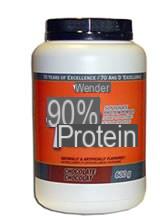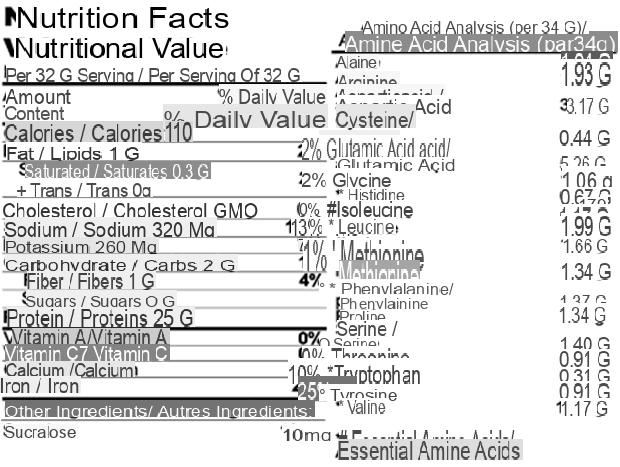
About 90% Protein Soy - Weider Supplements
90% PROTEIN SOY - WEIDER INTEGRATORI
Food supplement of isolated soy proteins
FORMAT
Pack of 800 grams cocoa flavor
COMPOSITION
Soya protein isolate; natural and artificial flavors; calcium caseinate; Dry egg white; Brewer's yeast; bromelain; sucralose; acesulfame K; Papain.
Amino acid profile
Product Features 90% Protein Soy - Weider Supplements
Product features: the manufacturer does not specify the origin of the soy proteins present in this supplement, defining them as concentrated at 90%. In reality, reading the label carefully, you can see that in a 32-gram portion there are only 25 grams of protein, equal to an average of 78% of the entire content.

Soy protein: they are vegetable proteins of good biological value, extracted from a plant belonging to the legume family. Unlike other legumes, soy has an amino acid profile that is remarkably close to that of the noblest proteins, even if it remains deficient in sulfur amino acids such as methionine and cysteine. Despite this deficiency, soy proteins are counted - together with those of eggs - among the proteins with the highest "biological value", at least according to the PDCAAS classification, which in addition to the simple amino acid profile also considers digestibility, bioavailability and effects. general information on the growth and development of infants aged between 3 and 5 years (age group where the protein requirement per kg is maximum). In addition to the plastic and reconstructive action typical of proteins, the presence of biologically active substances (very evident in the whole seed consumed), has allowed soy to approach Western and Mediterranean diets, guaranteeing a series of important benefits. The widespread use currently made of soy and derived products is partly justified by the presence of studies showing how the regular consumption of this legume can bring about a series of improvements:
- At the cardiovascular level: thanks to the cholesterol-lowering and cardioprotective action of soy lecithin;
- At the bone level: thanks to the presence of phytoestrogens with osteoprotective action;
- At a systemic level: thanks to the presence of isoflavones, able to counteract oxidative damage and reduce the onset of associated pathologies.
Therefore, the advent of soy in our diet was induced - in addition to purely nutritional factors - also by the marked dietary qualities, which go beyond its excellent protein content.
Soy protein and sport: several years of experimentation, and many studies in this regard, were necessary so that soy proteins could fully be included among the supplements used by athletes. The limited use that was made of these proteins was essentially determined by a series of false beliefs concerning the "hormonal" properties of this food: in fact, the various sportsmen mistakenly believed that the presence of phytoestrogens, natural substances with a hormonal-like action, could inhibit endogenous testosterone secretion and impair muscle growth capabilities. Several studies have also shown that the intake of soy protein does not absolutely alter this secretion, much less the testosterone / estrogen ratio. On the contrary, these supplements can guarantee the same positive effects on body composition induced by whey proteins. Among the common effects, an important adaptation to training was also observed, guaranteed by a marked improvement in the athlete's anaerobic performance and an increase in the fatigue threshold.
Furthermore, supplementing with soy protein has resulted in a number of other benefits, not observed for whey protein:
- Slimming action: determined by a significant reduction of the subcutaneous and abdominal adipose tissue;
- Anti-inflammatory action: carried out through a significant reduction in the levels of inflammatory cytokines, even after intense physical exercise;
- Metabolic action: guaranteed by an increased production of thyroid hormones, and by a reduction in urinary secretion of metabolites derived from tissue degeneration.
These effects could be associated both with an amino acid profile particularly rich in arginine and glutamine, and with the presence of natural antioxidants.
Bromelain: proteolytic enzymes known for their anti-inflammatory and anti-edematous effects. Their main application in this product is linked to the declared proteolytic effect, which guarantees a better digestion of proteins with relative enzymatic hydrolysis in free amino acids.
How to use recommended by the company - 90% Protein Soy - Weider Supplements
Dissolve 32 grams of protein in a cup of water, skim milk or fruit juice. Shake well and serve immediately. To facilitate mixing, a blender can be used.
How to use in sports - 90% Protein Soy - Weider Supplements
To define an optimal dosage, it is necessary to consider that the useful amount to be supplemented must be related to the total daily protein intake, and that this must be calculated on the basis of the constitutional and physiological characteristics, as well as the athletic needs of the athlete.
In general, it would be useful to take soy proteins away from main meals, and combine them with carbohydrates of various kinds, in order to optimize the various results. More precisely it would be useful:
- In the pre-workout: associate proteins with carbohydrates with a medium - low glycemic index, in order to energetically support athletic performance;
- In the post-workout: associate the supplement with carbohydrates with a medium-high glycemic index, in order to optimize glycogen resynthesis and stimulate protein anabolism.
In any case, it would be optimal to alternate proteins of different origins with proteins of vegetable origin - which in any case represent a very important nutritional source for allergic or vegan individuals.
Synergies - 90% Protein Soy - Weider Supplements
Proteins + antioxidants: the association of antioxidants seems to enhance the protective effect of proteins during intense physical activity.
Proteins + CHO: seems to be the most effective combination ever. In the pre-competition, suitably combined and choosing the most suitable source, carbohydrates can support performance and improve the energy properties of the muscle; in the post-work out, however, they can optimize the recovery and growth process.
Proteins + Creatine: always combined with carbohydrates, taken in the post work out, they seem to improve the increase in lean mass, even if not all studies agree.
Side Effects 90% Protein Soy - Weider Supplements
Known are the long-term side effects of a diet too rich in protein or amino acids; damage to the kidney, dehydration induced by increased urinary secretion, liver or kidney suffering, lipidemic alterations and related associated pathologies, tissue acidosis and bone demineralization, are just some of the consequences of an unbalanced diet over time. Among the harmful effects deriving from a diet too rich in proteins, there is certainly also the increase in adipose tissue induced by the complex metabolic crossroads responsible for the energetic-functional coordination of the organism.
In addition to the typical effects of an excessive protein intake, it should be remembered that other side effects are described in the literature, such as the reduction of thyroid function, the teratogenic action on the fetus and the alteration of the absorption of some drugs. However, these effects seem to be associated with excessive consumption of the whole legume rather than supplementing with soy protein powder.
Precaution for use 90% Protein Soy - Weider Supplements
The product is contraindicated in cases of renal or hepatic pathology, cardiovascular disease and / or hypertension, allergies and autoimmune diseases, during pregnancy, during lactation, under 12 years and for adolescents not yet trained.
In case of prolonged use (over 6/8 weeks) the doctor's opinion is necessary.
This article, elaborated on the critical re-reading of scientific articles, university texts and common practice, is for information purposes only and therefore has no medical prescription value. It is therefore always required to consult your doctor, nutritionist or pharmacist before undertaking the use of any supplement. Learn more about the critical analysis of 90% Protein Soy - Weider Supplements.
| BIBLIOGRAPHY |
Int J Sport Nutr Exerc Metab. 2004 Jun;14(3):255-71. Effect of an amino acid, protein, and carbohydrate mixture on net muscle protein balance after resistance exercise.Borsheim E, Aarsland A, Wolfe RR. Tessari P, Kiwanuka E, Cristini M, Zaramella M, Enslen M, Zurlo C, Garcia-Rodenas C. Moreno YF, Sgarbieri VC, da Silva MN, Toro AA, Vilela MM. Systemic indices of skeletal muscle damage and recovery of muscle function after exercise: effect of combined carbohydrate-protein ingestion. Beavers KM, Serra MC, Beavers DP, Cooke MB, Willoughby DS. Beavers KM, Serra MC, Beavers DP, Cooke MB, Willoughby DS. Campbell SC, Khalil DA, Payton ME, Arjmandi BH. Kalman D, Feldman S, Martinez M, Krieger DR, Tallon MJ. Effect of whey and soy protein supplementation combined with resistance training in young adults. Laskowski R, Antosiewicz J. Stroescu V, Dragan J, Simionescu L, Stroescu OV. Dragan I, Stroescu V, Stoian I, Georgescu E, Baloescu R. |


























